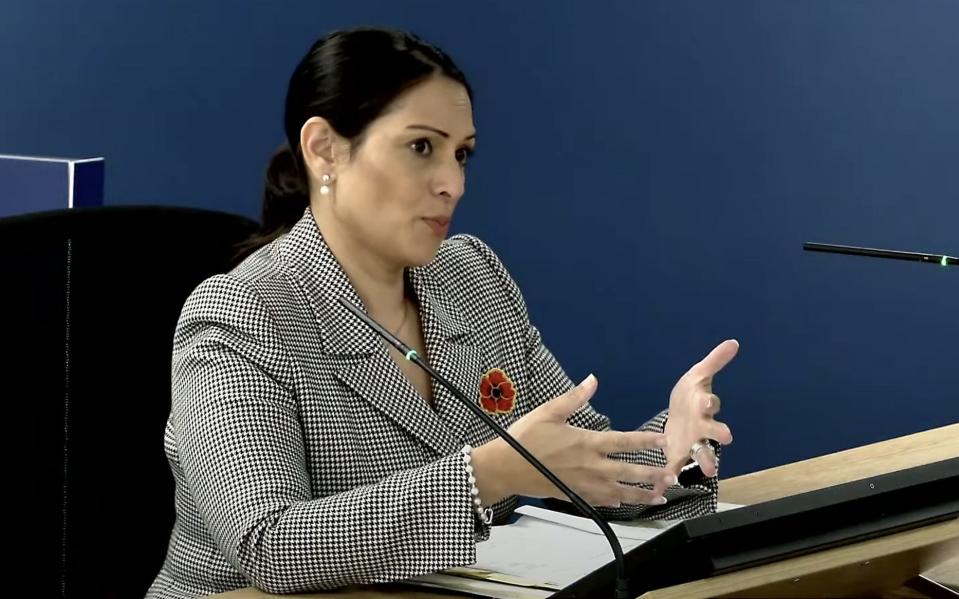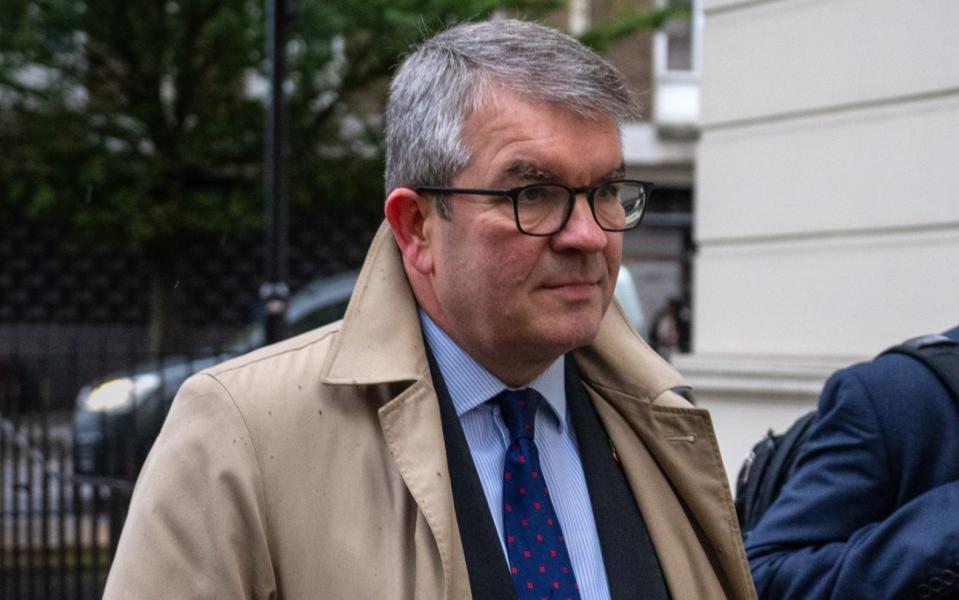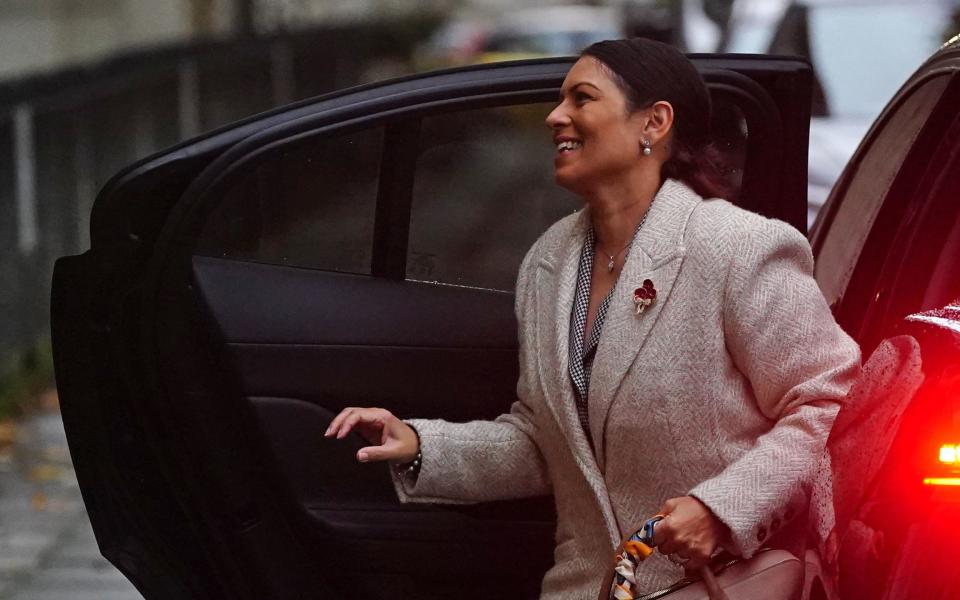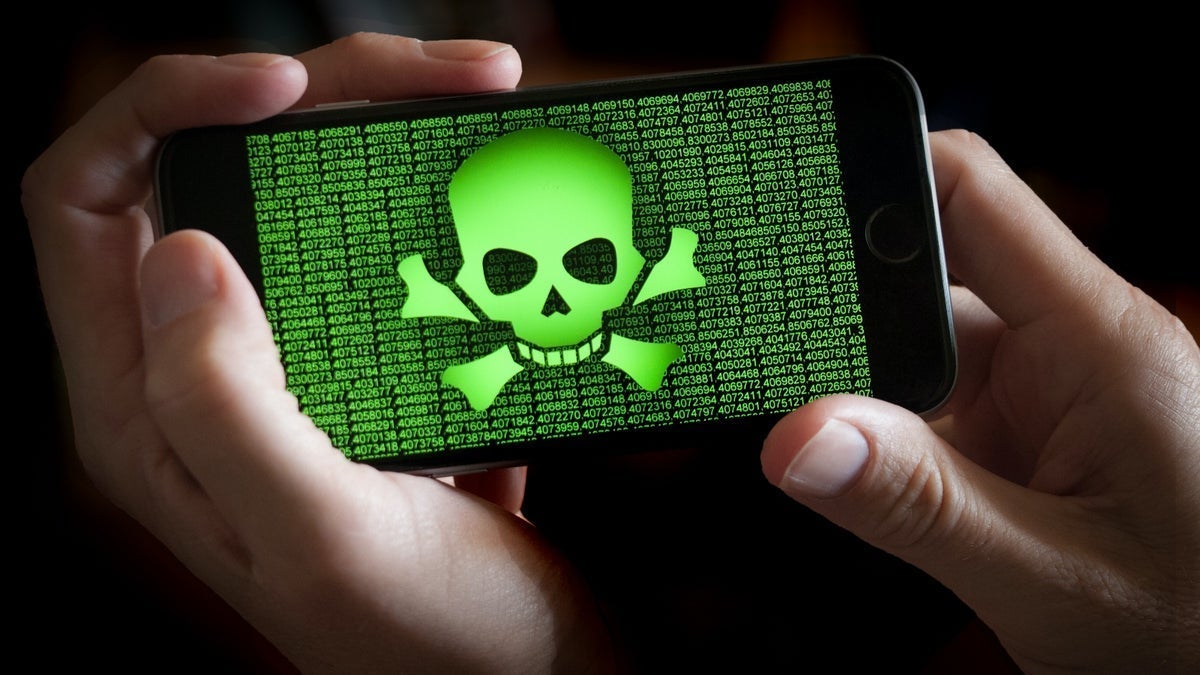Boris Johnson called for “bigger fines” for breaching coronavirus regulations during the pandemic, the Covid Inquiry heard on Thursday.
A handwritten note shown during the evidence of Priti Patel, the former home secretary, reveals the then prime minister wanted tougher punishments when responding to a proposal about the UK opening up after lockdown on Aug 15, 2020.
Mr Johnson wrote: “I agree with these openings, but the OVERRIDING MESSAGE should be about tougher enforcement and BIGGER FINES.”
However, Ms Patel suggested the £10,000 fine, introduced in the same month as Mr Johnson’s note, for breaching regulations was too high.
Questioned by Hugo Keith KC on whether the flat fine of £10,000 introduced in August 2020 was proportionate, Dame Priti said: “It was very high.”
Pressed again on whether it was proportionate, the former home secretary said: “The answer is no.”
Read all the developments from the day below.
04:34 PM GMT
That’s all for today
Thank you for following our live coverage of the Covid Inquiry. We will be back with more next week.
04:20 PM GMT
Patel had to remind colleagues of police independence
Priti Patel said she had to remind ministerial colleagues of the operational independence of the police.
She told the Covid Inquiry: “Throughout the pandemic I felt I spent a great deal of time reminding my colleagues of the role of policing … operational independence, and that we as politicians are not there to dictate directly to the police as to when to arrest people or enforce the law.”
03:41 PM GMT
Boris Johnson felt he could not criticise police over ‘argy bargy’ at Sarah Everard vigil, WhatsApps show
Boris Johnson felt he could not criticise police following the Sarah Everard vigil after watching footage of “some argy bargy without knowing what happened,” the Covid Inquiry heard.
WhatsApp messages from March 2021 show the former prime minister was seemingly reluctant to wade in to the row when two women were arrested for attending a memorial for Ms Everard, who was murdered by a serving Met Police officer, in Clapham Common
Minister of State at the Cabinet Office Lord David Frost’s message in the exchange was shown to the inquiry first, in which he said: “Police are in an impossible position in many ways because of the impossibility of enforcing current rules.
“We certainly should not throw them under the bus.”
Mr Johnson eventually gave his thoughts on how to handle the fallout from the vigil, saying: “Unless anyone strongly disagrees, I think it should be Priti who tweets tonight.”
The then deputy director of communications Jack Doyle responded: “Agree. She tweeted in time for the ten o’clock news and I think we got the tone right.”
Mr Johnson replied: “Feels odd to weigh in as PM and bash the cops when all I have seen is footage of some argy bargy without knowing what happened.
“Think Starmer looks a bit opportunistic and anti-police. But no doubt the female MPs feeling strongly.”
03:16 PM GMT
Messaging on public protests was ‘inconsistent’, admits Priti Patel
Priti Patel has admitted there was “inconsistency” in her public messaging about protests during the Covid-19 pandemic.
The former home secretary was questioned about a tweet on June 6 2020 in which she said “protests must be peaceful and in accordance with social distancing rules”, and then a piece in the Telegraph newspaper two days later in which she said large gatherings of people were unlawful.
Counsel to the inquiry Hugo Keith KC said: “From the standpoint of a potential protester, you do appear there to be speaking with two voices.”
Dame Priti appeared to give a wry smile before saying: “There’s inconsistency there, yes, I can see that.”
03:13 PM GMT
Met Police branded ‘moronic’ over Sarah Everard vigil
Boris Johnson’s advisers said the Met Police were “moronic” in policing the Sarah Everard vigil, as officers had “stood by” during Black Lives Matter protests, the Covid Inquiry heard, Blathnaid Corless reports.
In messages shown to the inquiry from a WhatsApp group which included the then prime minister, special adviser Declan Lyons shared a tweet from Keir Starmer criticising the police action at the vigil on March 13 2020.
“Moronic from met,” Mr Lyons wrote.
Ben Gascoigne, then the PM’s political secretary, replied: “Yup. We stood by whilst BLM rioted.”
In a later message in the group, Mr Gascoigne said: “BLM literally rioted and we did nothing. We can’t be in a position where cops are hugging women and then dragging them off the next. It’s not about saying the police are perfect, it’s about whether we police events like this or we don’t. It was so damn obvious this would happen.”
03:04 PM GMT
Sarah Everard vigil saw ‘totally inappropriate policing’
Priti Patel has said she was “dismayed” with how police handled a vigil to remember Sarah Everard during the Covid pandemic.
The former home secretary told the Inquiry: “I saw the news that night and just felt that that was totally inappropriate policing.
“So, inevitably, I had to raise that with the commissioner of the Metropolitan Police and then a lot of other work took place thereafter.”
02:57 PM GMT
Boris Johnson wanted ‘bigger fines’ for Covid rule-breakers
Boris Johnson called for “bigger fines” for breaching coronavirus regulations during the pandemic, the Covid Inquiry heard.
A handwritten note shown during the evidence of Priti Patel, the former home secretary, reveals the then prime minister wanted tougher punishments when responding to a proposal about the UK opening up after lockdown on August 15, 2020.
Mr Johnson wrote: “I agree with these openings, but the OVERRIDING MESSAGE should be about tougher enforcement and BIGGER FINES.”
However, Ms Patel suggested the £10,000 fine, introduced in the same month as Mr Johnson’s note, for breaching regulations was too high.
Questioned by Hugo Keith KC on whether the flat fine of £10,000 introduced in August 2020 was proportionate, Dame Priti said: “It was very high.”
Pressed again on whether it was proportionate, the former home secretary said: “The answer is no.”
02:48 PM GMT
Covid laws confused police and public, admits Priti Patel
Emergency coronavirus regulations were confusing to the police and the public, Priti Patel has told the Covid Inquiry.
Asked by Hugo Keith KC whether she would accept there was a “high degree of confusion” surrounding Covid regulations, Ms Patel said she did.
Mr Keith said: “Would you accept that there was throughout a high degree of confusion surrounding the meaning of the broad thrust of these regulations.
“They were complex, they were difficult to understand and that led to both confusion on the part of the public as to how they could regulate their behaviour and confusion on the part of police as to how they might be enforced?
Ms Patel responded: “I would agree, I would completely agree.”
02:32 PM GMT
Priti Patel – I’m not sure colleagues ‘thanked me’ for safeguarding children in pandemic
Priti Patel told the Covid Inquiry “I’m not sure colleagues in government thanked me” for her work on safeguarding children.
Questioned on whether children and abuse victims were considered as part of debates concerning protecting vulnerable people during lockdown in March 2020, the former home secretary said: “I can’t recall at that particular time, I cannot recall whether or not it was, but I do know that in terms of pressing for a wider definition of vulnerabilities and vulnerable people, I do know children came into it.
“The reason, as I’ve already touched on, is partly because of the work that I was pressing across government.
“I’m not sure my colleagues in government thanked me at the time, particularly around children, county lines, missing children.
“It’s a major part of our work in the Home Office.”
01:47 PM GMT
UK unable to prevent Covid arriving through border
As we wait for the Covid Inquiry to resume, we can revisit some of Priti Patel’s evidence before the break.
The UK was unable to stop coronavirus arriving through its borders in the early stages of the pandemic, the Covid Inquiry heard.
Priti Patel, the former home secretary, said there was a “distinct absence of practical capability” to resist the infection in the UK with no “effective system” in place when the virus attacked.
“At that stage the skills and capabilities simply weren’t there,” she told the Inquiry.
01:10 PM GMT
Covid Inquiry adjourns for lunch
The Covid Inquiry has now adjourned for lunch shortly after Priti Patel was sworn in to give evidence.
Ms Patel will return at around 2pm.
01:06 PM GMT
Discussions on closing UK borders were ‘political for obvious reasons’

Priti Patel has said discussions surrounding the closure of UK borders at the start of the pandemic were at times “political for obvious reasons”, the Covid Inquiry heard.
Ms Patel was asked by Hugo Keith KC: “To what extent were decisions concerning borders and restrictions and closures, or whatever they may be, driven by political considerations as opposed to pure public health matters?”
The former home secretary replied that there was no “straightforward answer”, because it was a “fraught time” and “the world was changing quite rapidly”.
“Our hands I think were effectively forced really because of what was happening in China,” she said, adding that she could “categorically” say that discussions were happening across Government at all levels at the time.
“There were live discussions. You could argue in some quarters, they were political. Absolutely. They were political, for obvious reasons.
“While at the same time we were having practical discussions every single day with officials and ministers, certainly within my department and officials were having cross government discussions around some of the … health implications we were seeing,” she added.
12:33 PM GMT
Martin Hewitt finishes evidence
Martin Hewitt has now finished giving evidence to the Covid Inquiry.
Priti Patel is immediately sworn in and will be questioned by Hugo Keith KC.
12:04 PM GMT
Children should have had more ‘clarity’ about what to do in lockdown, police chief suggests
Mr Hewitt suggested there should have been more “clarity” from the Government about what children were allowed to do in lockdown, Blathnaid Corless reports.
He told the Inquiry: “The concept of going out to have your daily exercise is a very different thing if you’re four and five years old. It’s not going for a run or going for a walk.”
He said the guidance, or lack thereof, on this “was not helpful”, and put police officers who were on the ground in a “very invidious position”.
12:00 PM GMT
Police chiefs given 16 minutes notice to enforce new Covid rules
Mr Hewitt said he was forced to put off enforcing new coronavirus laws because he only received the legislation from Matt Hancock 16 minutes before it should have come into force, the Covid Inquiry heard.
“There was a regulation that was going to change at one minute past midnight and we received the regulations signed off by the secretary of state for health and social care (Matt Hancock) at 11.45 so we had precisely 16 minutes,” he told the Inquiry.
He said briefing documents must then be worked up translated into Welsh before being shared.
“But in that particular example where we had 16 minutes I had a conversation and was very clear with the home secretary at the time (Dame Priti Patel) that we would not be enforcing that regulation on that day and it was going to take us probably … 24/36 hours to actually get to a place where I was confident police officers out there knew what they needed to do.”
More problems would arise at 7am the following morning when ministers were “spinning round” the television and radio studios would be talking about this, he said.
He would then have to be “very clear that would not be enforced immediately because it was unfair to put the officers in a position where they didn’t understand precisely what they were supposed to be doing”.
11:54 AM GMT
Police officers should have had more involvement in new Covid laws
Police officers should have had more involvement in the creation of new laws brought into force in the early stages of the pandemic, the Covid Inquiry heard.
Martin Hewitt said it was “certainly one of our frustrations” that police were not drafted in at an “earlier stage” to give a perspective on the enforcement of new regulations.
He told the Inquiry there was a “limited number of occasions” when he was able to speak on behalf of the police with the Home Office often advocating for police forces.
11:47 AM GMT
George Floyd protests and Sarah Everard vigil were ‘key challenges’ during pandemic
Mr Hewitt was asked about public protests including those after the murder of George Floyd and the vigil for Sarah Everard at Clapham Common, Neil Johnston and Blathnaid Corless report.
“Dealing with the protests, whether it was in 2020, or or subsequently in 2021 was one of the really key challenges that the police service had to face as I think I’ve said or alluded to, certainly a number of times, whilst we were having to do what we were having to do to support the COVID response, we equally had to see all of that against the backdrop of our broader policing responsibilities”.
The Inquiry heard there was an exchange between a number of people and who worked in Downing Street, including Boris Johnson and some of his advisers, on the night of the Sarah Everard vigil.
During those exchanges, Lord Frost, who was then the Minister of State to the Cabinet Office, was said to have remarked: “The truth is, the rules on outside gatherings are close to unenforceable, and are evidently being widely ignored in all kinds of contexts now”.
11:37 AM GMT
Law-abiding citizens struggled to understand Covid rules
Law-abiding citizens struggled to understand localised Covid rules because of the speed at which they changed, Mr Hewitt told the Covid Inquiry.
“Once it started to change and then once it was really changing quite rapidly and you were getting tiers and you were getting localised, it became incredibly difficult for even a perfectly law-abiding and committed citizen to understand precisely what that meant for them in their own personal circumstances,” he said.
Having different regulations “on opposite sides of the same road” made policing more difficult, he added
Mr Hewitt also said people becoming “fed up with the regulations” had the effect of sapping “away at the morale of the officers who are just trying to do their job in pretty difficult circumstances”.
11:30 AM GMT
Ministers ‘incredibly unhelpful’ on new Covid laws
Martin Hewitt has said he often had to correct “incredibly unhelpful” information from government ministers when they spoke about new coronavirus regulations, the Covid Inquiry heard.
Mr Hewitt, the former chairman of the National Police Chiefs’ Council, said politicians repeatedly declared incorrect information during the morning media round on radio and television.
He told the Inquiry the on-duty minister would sometimes “refer to guidance as if it was regulation, or vice versa”, which would lead to “confusion” for the public.
“On a number of occasions, I then found myself going and doing the sort of lunchtime media to try and say no, in fact, that’s not that’s not illegal,” he said.
Mr Hewitt added that although he understood the situation was “challenging” and that the regulations were regularly changing, it made the rules “incredibly confusing to understand”.
11:21 AM GMT
Inquiry chairman criticises ‘bad’ Covid legislaton
Covid Inquiry chairman Baroness Heather Hallett has criticised “bad” coronavirus legislation that gave police the powers to compel people to take tests.
She said: “The power to direct a test, A) that’s an extraordinary power to enact, and I shouldn’t criticise our elected representatives but I can’t see the purpose. I see an awful lot of uncertainties, reasonable grounds, whether it’s unpractical, having to have a public health officer. And there are so many reasons why that’s a bad piece of legislation.
“Again I shouldn’t criticise but I am going to.
“It’s something we need to get into whether, or when, we have another pandemic we have on the books ready to go legislation that’s better than this.”
Martin Hewitt, the former chairman of the National Police Chiefs’ Council, said that the powers were never used but agreed with the chairwoman.
“How on earth one forms a reasonable ground to suggest that somebody has or may be infected with a virus you can’t see seems to me quite a challenge in a practical sense,” he said.
11:11 AM GMT
Beauty spot visitors ‘put pressure on police’
Divergence in regulations in different parts of the UK and people travelling to beauty spots put pressure on policing, Mr Hewitt told the Covid Inquiry.
He said people were “travelling in some cases hundreds of miles” to go to beautiful parts of the UK, making locals “quite angry” about “lots of people from other parts of the country coming into those communities when they are they are abiding by all the rules”.
“People’s preparedness to comply is eroded when I think that the other person over there is having an easier time than me.
“And this particularly became relevant when we started to get local lockdowns and and in some places where you would have literally on opposite sides of the road different regulations for people.
“But I think that became quite a feature if you talk about those beauty spot areas where people were saying ‘we are doing this, we are not moving, we are staying local, and these people are coming in and potentially putting us at risk’.
“And that puts a pressure on policing.”
10:59 AM GMT
The four Es: What are they?
Mr Hewitt has repeatedly made references to the four Es which is how police officers tried to enforce restrictions effectively during the pandemic.
They stand for:
-
Engage
-
Explain
-
Encourage
-
Enforce
He tells the Inquiry that enforcement was the last resort in the event an individual was failing to comply with police.
10:26 AM GMT
Covid policing measures not seen since Second World War
Mr Hewitt told the Inquiry that the kind of policing measures being taken in the pandemic had not been seen in the UK since the Second World War, Blathnaid Corless reports.
“You could see the kind of measures that were being taken were measures that, as far as I’m aware in policing terms, nothing like that had happened since the Second World War.
“So we were going to be into positions where we were going to be imposing on people’s liberty and movement and their lives in a way that was totally out of our experience at that point in time,” he said in evidence.
10:22 AM GMT
Police officers in ‘largely uncharted territory’
Martin Hewitt said police forces were in “largely uncharted territory” during the pandemic, as it had to engage in what he described as “public health policing”, Blathnaid Corless reports.
The former chairman of the NPCC wrote in his witness statement: “Provisions of the Coronavirus Act 2020 and related Covid-19 Regulations led the police service into public health policing, which was largely uncharted territory.
“This unprecedented situation called for an unprecedented response.”
10:05 AM GMT
Covid Inquiry under way
Martin Hewitt has been sworn into the Covid Inquiry and has begun to give evidence.
09:55 AM GMT
Recap: The Covid Inquiry on Wednesday
As we await the start of the Covid Inquiry today, let’s take a look at what happened yesterday when former cabinet secretary Mark Sedwill gave evidence.
The Inquiry heard that working in Downing Street during the pandemic was like “taming wild animals” while Lord Sedwill accused Dominic Cummings of “running a dictatorship” and suggested Boris Johnson should sack Matt Hancock to “save lives”.
Read more here.
09:46 AM GMT
Who is Martin Hewitt?


Martin Hewitt, who is due to give evidence first this morning, is a police chief who served as chairman of the National National Police Chiefs’ Council (NPCC) for four years until his departure earlier this year.
Mr Hewitt joined Kent Police in 1993 before later transferring to the Metropolitan Police where he rose through the ranks to become an Assistant Commissioner.
During the pandemic he participated in the government’s daily briefings and described the coronavirus crisis as “new and uncharted territory” in his final speech as NPCC chairman.
09:38 AM GMT
Good morning


The Telegraph will be providing live updates from the Covid Inquiry today with former home secretary Priti Patel expected to give evidence.
Ms Patel is likely to face questions about her approach to controlling the border and the policing of lockdown rules.
She lobbied for stricter border controls in the early stages of the pandemic in an attempt to prevent the virus reaching the UK, but was overruled.
Other witnesses due at the inquiry on Thursday are Martin Hewitt, the former chairman of the National Police Chiefs’ Council and Jun Pang, policy and campaigns officer with human rights group Liberty.

Elaine Hadley is a dedicated journalist covering the ever-evolving landscape of U.S. news. With a keen interest in politics and a commitment to uncovering the truth, she provides insightful commentary and in-depth analysis on domestic issues. When not reporting, Elaine enjoys exploring the diverse cultures and landscapes of the United States.






